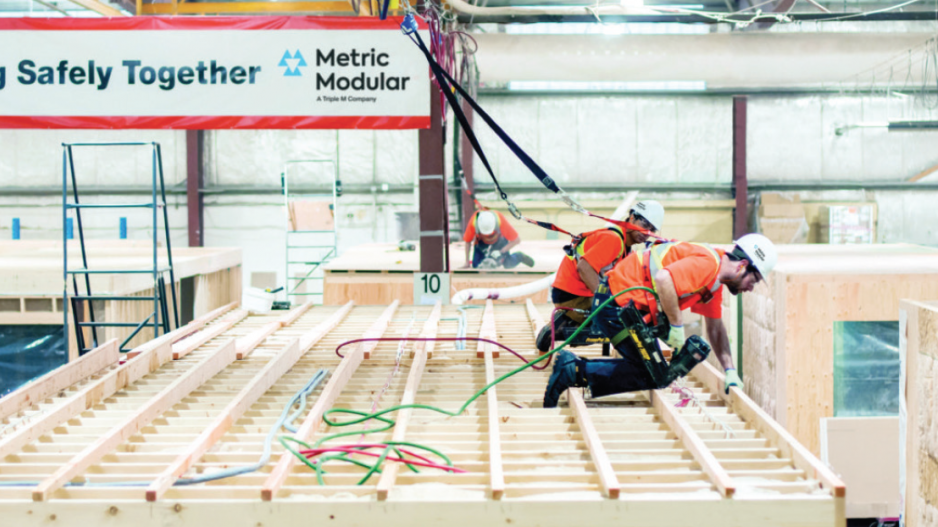Modular housing has been gaining ground not only as a viable option to end homelessness, but also as a solution to multiple issues surrounding affordability.
“We are seeing growth and opportunities for affordable housing as that is at the front of the news right now in most urban centres within British Columbia,” said Craig Mitchell, director of innovative solutions at Metric Modular.
The company, previously known as Britco, is one of North America’s largest modular-housing companies.
Metric Modular, No. 32 on Business in Vancouver’s Top 100 Manufacturers in Metro Vancouver list, was sold earlier this year, and the company split its business into two.
Leaving behind the rental component of the company, Metric focuses solely on manufacturing multi-family modular units and other commercial modular products like education facilities and hospitality venues.
“Our buildings are built at higher standards than site-built construction,” Mitchell said. “It’s the same thing as buying an Audi out of a manufacturing plant as opposed to someone building an Audi in their garage.”
There are four modular-housing projects in Vancouver. An upcoming project has been proposed for the parking lot in the 500-block of West 2nd Avenue off Cambie Street, and a pilot project has been operating at Terminal Avenue and Main Street for almost a year.
According to Mitchell, the affordability dilemma has put Metric Modular on the map, but the potential of modular housing is far greater than what’s been explored. While modular housing is a viable option to help combat homelessness, being closely associated with the issue has also been something of a thorn in Metric’s side.
“One of our main challenges is typically related to things such as perception,” Mitchell said. “We have a perception in the marketplace as being trailer builders versus high-quality home builders."
“Something from a manufacturing standpoint that people are now just getting their heads wrapped around is that this is a better way to build. Building things off-site results in timelines that are 30% to 40% faster than site-built construction, and from a production line standard, the quality in a production line is going to be far higher than something built out in the field.”
The company owns two production facilities, one in Agassiz and one in Penticton, both with more than 100,000 square feet of manufacturing capability. Metric’s headquarters are in Langley, and the company employs more than 200 people.
Mitchell sees huge opportunities in a number of different areas such as the construction of modular hotels. Additionally, the company has started to focus on passive housing, which is built to rigorous energy efficiency standards. Because they use less energy, passive homes don’t need conventional heating and air conditioning.
“There are a lot of changes in building codes, which means higher-performance buildings are expected,” he said. “Building in a manufacturing facility makes it easier to obtain the standards required under performance building.”
Architect Michael Geller, president of Geller Group, said modular housing is an underused form of construction.
“Almost every day now, I hear about some new initiative in the world to build not just single-family houses but highrises using modular housing.”
Geller first suggested expanding the use of modular housing 10 years ago when he ran for city council, but he has been frustrated by what he called the City of Vancouver’s sluggish adoption of the idea.
“While temporary or relocated modular housing is being used for the homeless, there is no reason it can’t be used for housing young people who are not put off of the idea that not only might you move but the housing might move from one vacant land to the other.”
The need for student housing is often a contentious issue in the city as well, with young adults reluctantly accepting ill-suited spaces due to budget and time constraints.
Penny Gurstein, community and regional planning professor at the University of British Columbia, said construction methods for modular housing are continually evolving.
“There has been a lot of very interesting work in terms of the technology to make modular housing quite attractive,” Gurstein said. “This reduces the cost of construction significantly, and I know in other countries like China they are really developing this kind of technology.
“Architects and designers are now talking about this, that there is going to be this kind of major revolution in how buildings get built … through robotics and other things, so I think it is a really interesting time, and to be experimenting with this is very important.”




